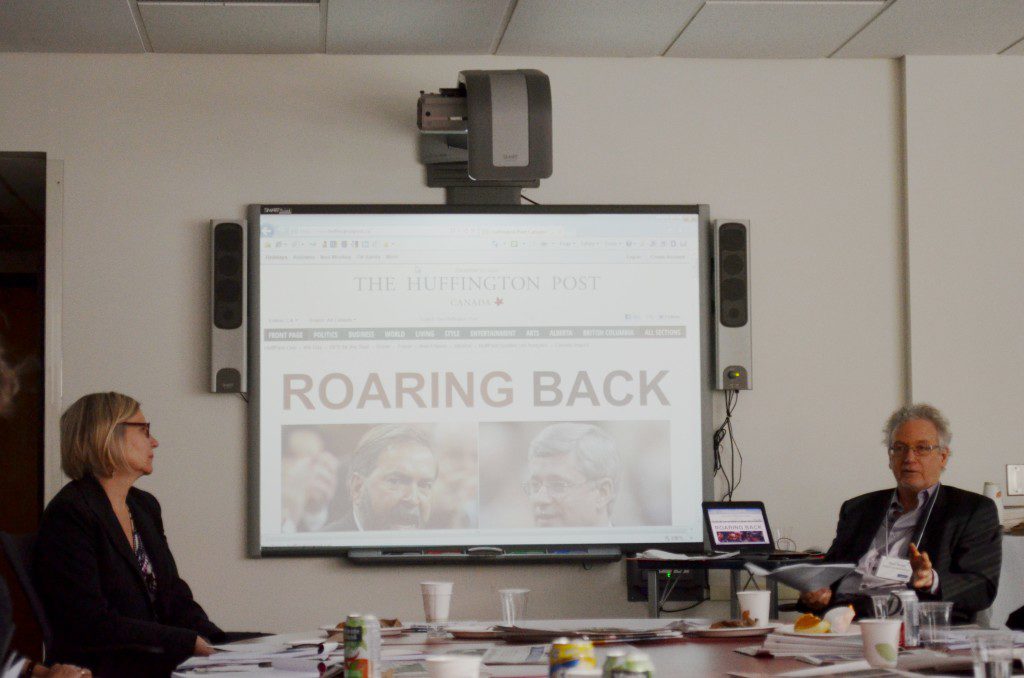By JACKIE HONG
STAFF REPORTER
Journalism professor Ann Rauhala stands at the head of the class, trying to coax answers from a full but awkwardly silent room. This is no ordinary teaching moment though – instead of nervous undergrads, these are 15 Ryerson professors who have just finished reading a newspaper op-ed article. They’re all here to learn how to write an op-ed of their own. To do that, they are analyzing what sets great pieces apart from dull, poorly constructed ones.“What makes this one good?” Rauhala asks, holding up a copy of an op-ed about the absurdity of paying extra to jump ahead in the ride queues at the CNE.
Someone speaks up: “There’s good imagery… You almost feel like you’re in the midway.”
And then someone else: “The sentences are short, but in a good way; simple language.”
Rauhala gives an encouraging smile and nods as more voices join in. A few minutes later, the silence has been replaced with animated discussion as everyone eagerly shares how different aspects of the op-ed came together to create a polished product.This conversation was one of many at an op-ed writing seminar hosted by the School of Journalism on Dec. 13. Faculty and staff from every corner of the campus came together to learn how to transform scholarly expertise or research into op-ed items for general audiences.
The session, organized by Rauhala, associate director of the Ryerson Journalism Research Centre, and Johanna VanderMaas, a media relations officer at Ryerson’s Office of Public Affairs, attracted professors from fields including industrial engineering, science, business, disability studies, and theatre.
“All the faculties have relevance to the outside world and they realize that, and it’s wonderful to have (professors from) science…. TRSM (Ted Rogers School of Management), and (professional) communications. They all understand that their messages need to be heard by the general public, and I think that’s great,” VanderMaas said.
Op-eds are media articles written by scholars or other outside experts. Usually short and to the point, op-eds offer professional, informed opinions on current events. They also give authors a chance to showcase their research and participate in debates about timely issues –and that’s why journalism professors hope to encourage their colleagues to step up to this opportunity.

Journalism professors Janice Neil, Paul Knox and Rauhala gave advice on how to structure and write op-eds and pitch them to editors. The professors-turned-students used newspapers to brainstorm for ideas and were challenged to come up with pitches they could summarize in no more than 25 words.
The journalism profs gave feedback, pointing out strong areas in their pitches and elements that could be improved.
“You have to have something fresh and original to say… but they have to be more than opinion,” Neil said, adding that the writing must be supported by facts. “You want to entertain (readers), and inform them.”
She cited a maxim on newsworthiness often attributed to late CBC interviewer Barbara Frum. “Tell me something I don’t know about something that matters to me.”
Other tips included putting the main thrust of an article near the beginning, explaining complex or technical ideas without condescension, and pitching a piece to only one publication at a time.
Knox told them that editors were eager to find new contributors who wrote quickly and well. They might even pay a little.
Participants said afterward they were encouraged to use op-eds as a way of reaching a wider audience.
Darcy Brooks, a research assistant and freelance writer for the Ted Rogers School of Management, attended the sessions, and said she would be interested in going to future presentations.
“The point about making sure that the gist of the article is right up there, in the beginning, was really great. I hadn’t thought about it in the past. It makes a lot of sense now that I’ve heard it explicitly,” Brooks said.
Rauhala and VanderMaas hope to build upon the four-hour seminar.
“Most of the people here seem interested in speaking further. We could do a more workshop-type session where people get to work on their own stories, and get some feedback right on the spot. I also think, though, that the School of Journalism and the Ryerson Journalism Research Centre have the potential to go off campus and share what we’ve learned here,” Rauhala said.
